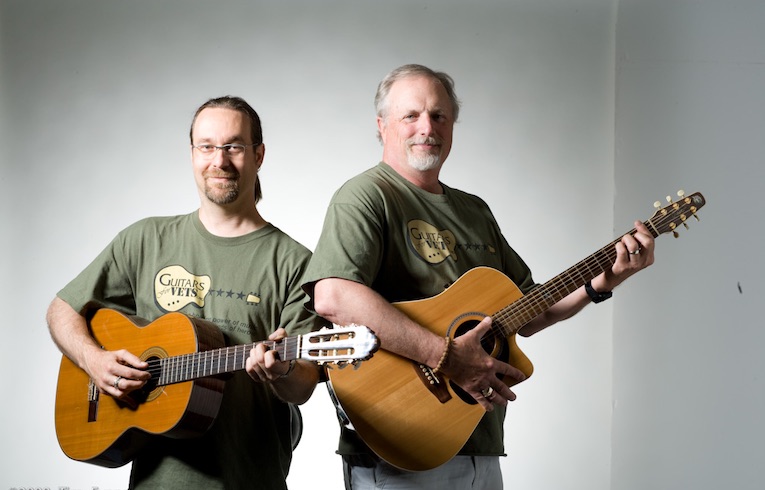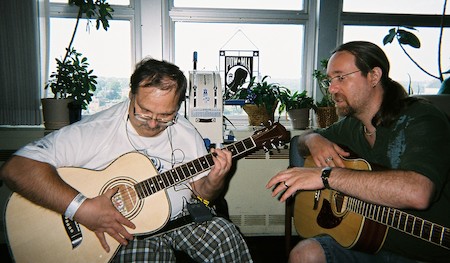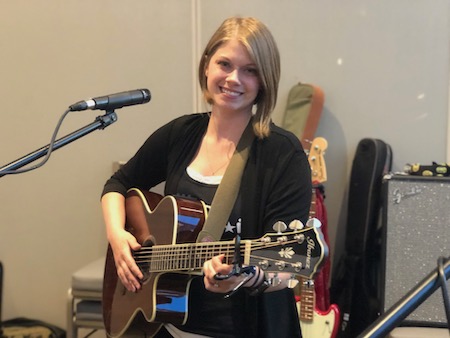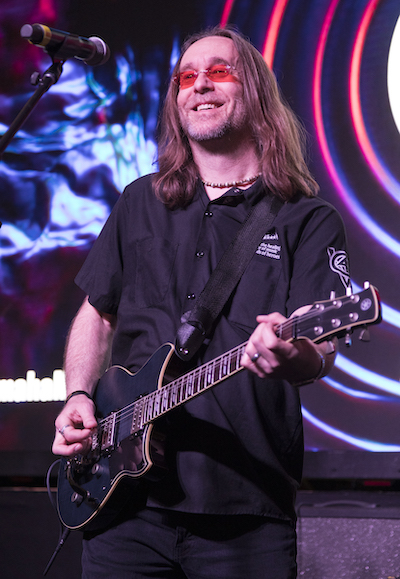
Patrick Nettesheim, Dan Van Buskirk Founders of Guitars For Vets
By Martine Ehrenclou
In 2007, Patrick Nettesheim, a Milwaukee guitar instructor and Vietnam-era marine, Dan Van Buskirk, co-founded Guitars For Vets, a non-profit organization that offers a guitar instruction program aimed at providing Veterans struggling with physical injuries, PTSD, and other emotional distress, a unique therapeutic alternative. G4V’s mission is to share the healing power of music by providing free guitar instruction and a new acoustic guitar and accessory kit, in a structured program run by volunteers, primarily through the Dept. of Veterans Affairs facilities and community-based medical centers. The organization also offers in-person guitar groups across the U.S. and has created a cyber chapter to accommodate students online during the pandemic.
Nearly one million military veterans suffer from Post Traumatic Stress Disorder, which can include depression, anxiety, panic attacks and more. More soldiers have committed suicide since the Vietnam War than actually died in battle. The healing power of music helps soldiers cope. Guitars for Vets has fulfilled over 40,000 lessons and distributed over 4,000 guitars for free to military veterans. They operate over 110 chapters in more than 40 states with the help of hundreds of volunteers. They have ambassadors such as Tommy Emmanuel, Tony Polecastro, Halestorm, Krista and Joey Belladonna, Thom Train, and more.
Martine Ehrenclou: Can you tell me about what Guitars for Vets is all about?
Patrick Nettesheim: We give guitars to veterans. We provide guitars and guitar lessons to our brothers and sisters who have served in the U.S. Military forces and are struggling from the effects of post-traumatic stress, in some cases it becomes post-traumatic stress disorder. By giving them guitars and guitar lessons, it is a path to re-establish a sense of joy and purpose. It not only helps the player but it pays itself forward to whoever is around them.
Martine: How does that process work?
Patrick: The student is referred to us by their healthcare giver at a VA medical center, a Vet center, or community based outreach center. However, we are now opening the program up to any Vet because we are expanding what we call our cyber chapters. That’s a pivot we did in COVID 2020, in order to keep our 110 plus chapters rolling. We had to find a way to get people together. This past year, since I’ve discovered video teleconferencing, I’ve had more face to face connections with people than I have had in years.
Martine: That’s something great that came out of COVID.
Patrick: Definitely. We are focused on treating vets with PTSD, but if you’re a vet and you know something has got you down, just come into the program and learn how to play guitar. You get 10 free one-hour lessons, you’re paired up with the volunteer guitar teacher, usually once a week. And at the end of that time, you’re awarded a brand new acoustic guitar, which is either a Yamaha FG800 or an Epiphone acoustic guitar. Then you also get all the accessories with that. You get the gig bag, the strap, tuner, strings, and DVDs to watch to learn how to continue playing, access to online learning, everything you need to enjoy that instrument. People can go to guitarsforvets.org or they can call 855-G4V-HERO (1-855-448-4376) and talk to a live person.
When times improve (COVID), and if you’re at a brick and mortar chapter, you get group lessons after the 10. They meet once a week.
That’s where teamwork and camaraderie is established, friendships, sharing. It’s not like your typical group therapy session. We’re not therapists, we’re just people teaching folks how to play guitar.
But it is therapeutic. In some of our group lessons, people just hold their guitar and they talk, and they connect. What a great catalyst for human interaction just having the instrument in your arms can be.

Patrick Nettesheim Tommy Emmanuel Ambassador Guitar4Vets
Martine: Definitely. Can you tell me about the healing power music for veterans?
Patrick: Yeah. It’s one of those things we’ve all experienced, though some of us just don’t realize exactly what it is. But we all love music and hear a song and you feel better because you love that tune. That’s it, right there. That’s the piece. It’s really simple. We’re just reminding these veterans, that you are capable of feeling good even if it’s for 30 seconds. You can see that you’ve just opened, to quote a phrase, “You open windows of serenity.”
Martine: I like that term. And those windows most likely build on each other.
Patrick: They do. When you’re struggling with depression, anxiety, panic disorder, and loss of sleep, and all the crazy stuff that comes from being exposed to trauma, you learn that you have that capability, that it’s still there. If you’re alive, the spark is still there. Some people just don’t see it anymore. But we throw fuel on that. And then by its nature, when you start feeling better or you start believing in yourself again, you’re more likely to see your therapist, your doctor.
Martine: How did you first discover that learning and playing guitar helped Vets with PTSD, depression and anxiety?
Patrick: When I learned about it was when the gentleman who became my co-founder came in for guitar lessons. This would have been in fall of 2006. His name is Dan Van Buskirk. Dan is a veteran of the Vietnam era. He served with First Marine Recon in 1968 and 1969. He was stationed in an area in Vietnam known as Da Nang. His job was to identify the infiltration of the NVA, the North Vietnamese Army with the Vietcong.
That was his job. And Dan was very good at his job. So, a lot on his heart and mind all those years later that he’s still trying to reconcile and being haunted by the faces of his buddies, his brother. You get close like family–all between the ages of 18 and 22 whose lives were taken away in an instant.
Martine: Tell me more about guitar lessons with Dan.
Patrick: Here we got me, the hippie, and then the Vietnam Marine working together. It was my opportunity to speak to somebody who was actually there who experienced it. And what a gift that was. Dan shared stories with me that I was honored he was trusting me with. But I was also horrified at hearing them.
Martine: You provided a trusted ear as well as guitar instruction.
Patrick: Yes. This is why we teach our lessons. You find that people have to get stuff off their chest before they can really start learning. They can come in and talk to an empathetic soul. We always tell our volunteers that you have to know how to play guitar somewhat, but you need to have patience, acceptance, gratitude, and empathy. And when they speak to somebody who has those four qualities, they get that off their chests. And that thing comes from heaviness. Heaviness you feel in your chest when there’s a lot of discontent.
It really became obvious with Dan when he was telling me, “In the middle of the night, if I have a nightmare, I pick up my guitar and go downstairs and strum. I don’t have to wake up my wife. And it grounds me. I know I’m in the here and now.”
Martine: That’s a beautiful thing.
Patrick: It truly is. And we all know that playing guitar becomes like a sixth sense. If you’re gigging or playing, just practicing, whatever and you’re really into what you’re doing, it becomes more of a primal reaction.
Martine: How did this whole process begin with Guitars For Vets?
Patrick: Dan recommended that we take the guitars down to the VA in Milwaukee, where we lived at the time, and where this got started, to play for some of the men and women in spinal rehab.

Gary, guitar student, Patrick Nettesheim
I said yes. And on the way down, we stopped at a local music store in Brookfield, Wisconsin, called Cream City Music. My buddy at that time, Joe Gallenberger owned that store. And his dad had recently passed who served in the Korean War. So, Joe said, “Here’s two guitars.” He gave us two brand new guitars to take down and gift to two vets.
Martine: That’s so nice.
Patrick: We gave the guitars away at that moment and these two men lit up like a holiday. It was obvious we had to teach them how to play. And that’s how the teaching began. This was in June 2007.
And the nursing staff, they hadn’t seen this much joy out of these guys since they had come in. They were in there for 6 to 8 weeks. They said, “Please come back next week.” And we did. And then we had another batch asking, “Hey, can I get a guitar? Can I learn how to pay?” I told Dan, I said, “Listen, man, I’m already good at not making money. Maybe we should start a nonprofit.” (laughter)
Martine: (laughter) That’s a great line.
Patrick: I google searched Guitars For Vets and there was not one return. I’m like, well, I guess that’s what we call it. It’s what we do. And I came up with a slogan, “the healing power of music in the hands of heroes.” I would say, 99% of vets do not consider themselves heroes. But as a civilian, I do.
Martine: I sure do.
Patrick: I just want to heal people. If I wasn’t a musician, if I was born into wealth, I would have been a doctor, but I chose the pauper’s path, and now this gives me a chance to do both.
Martine: So what happened after you and Dan decided to start Guitar For Vets?
Patrick: The genesis of the program really was when we took these guitars or this idea of getting guitars and providing lessons over to an area in Milwaukee called the VA domiciliary. They provide living quarters for men and women who are homeless, or if they’re waiting for an operation at the hospital, or people who are dealing with substance abuse, people who are dealing with severe trauma who need a place to stay.
And that’s when we decided to start teaching there and really dealing with PTSD head on. It just took off because when something grievous happens in one’s life, we lose a loved one, it is the most obvious example, you feel this heavy burden of sorrow.

Happy Veteran Erin
It hangs like a trance. And it’s all you think about. It colors your emotions. It colors everything. Struggling with severe PTSD, it’s usually just full-on, and it can last a long, long time. It really gets in the way of one’s functioning.
So, when you pick up the guitar and you’re holding it in your arms, the guitar’s resonating right into that emotional core of yourself. The first chord that we usually teach is E minor. It’s an easy one to access, and it’s just deep, sorrowful. It touches the soul and really brings out a lot.
When you’re concentrating on playing that chord and you got your second finger on the second fret of the fifth string, your third finger on the second front of the fourth, you’re holding your pick and you’re strumming it, you’re hearing it. You’re feeling it. You’re getting the response from your instructor. And you break the trance. That’s that window of serenity I mentioned before. You open that up.
Martine: And the wonderful thing is that people can do that themselves, on their own. So, they’re not relying on the teachers or any program in between lessons or group sessions. It’s like that expression about teaching people how to fish.
Patrick: That’s it. That’s precisely it. I mean, in most cases, you wouldn’t want to take your therapist home with you. In this case, you do.
We want to grow this program. Our plan last year was to graduate over 1000 students. And because of the plague (COVID), we weren’t able to get there. But this year we want to get to 1000, and next year we want to try to double that.
Martine: Is Guitars For Vets worldwide?
Patrick: I’m glad you asked that. We just opened our first chapter in the UK, in Wales, England. And we have three chapters in Australia. We have 110 chapters in the United States.
Martine: How do you find guitar instructors?
Patrick: We’d love to have more instructors. You need to know how to play guitar but it doesn’t have to be great. Most of the students come into their lessons not even knowing how to take it out of the case. You need to have those qualities I mentioned–patience, acceptance, gratitude, empathy. And these are non-compensated positions. Or at least in the classical sense of the word, you don’t get money, but there is a spiritual wealth to be found here.
You call the info number (1-855-G4V-HERO), we do an interview, and we’ll hook you up with one of our chapter coordinators. If there’s not a chapter in your area, you can start a chapter. We’ll train you how to do that.
We partner with Yamaha, Gibson brands, Epiphone, and we’d love to get Fender on board. I was just talking with ESP (guitar company). They also have Takamine guitars. We’re working out a deal with them as well as Taylor Guitars.
Martine: I see you have a lot of celebrity musician ambassadors like Tommy Emmanuel, Fabrizio Grossi, Tony Polecastro, Halestorm, and more. See list of ambassador musicians here
Patrick: Tommy Emmanuel is our most active ambassador. He talks about us at every single show. He managed to raise tens of thousands of dollars for us every year. Whether he’s selling gear he has, or asking his audience for donations, Tommy is really out there working it for us. We’ve got some other really great ambassadors. We have supporters, corporate sponsorship and ambassadors. There are some really cool people on there.
Martine: Tell me about what you’ve encountered with the stigma with PTSD. If you’ve encountered it with vets, are they resistant to say, “I have it or I think I have it”?
Patrick: Yes. It is especially difficult as a warrior because you are told that you can do anything. They’re told, “Don’t worry about your shortcomings because the person next to you in combat is looking out for you. All you have to do is look out for everyone else.” Now, it doesn’t work that way in civilian life with PTSD. It’s so personal and so intricate that most veterans who struggle with PTSD go 15 or more years before they seek help.
Martine: That’s so long.
Patrick: It’s extremely long. The VA is doing a great job of encouraging vets to get help for this. They say, “It takes the strength and courage of a warrior to ask for help.”
With twelve step programs they talk about the 1000 pound phone. (The phone is perceived as weighing 1000 pounds and sometimes not picked up in a crucial time of need.)

Patrick Nettesheim, Yamaha Stage, Winter NAMM 2019
For Vets it’s amplified because they are taught to suck it up. That terminology comes back from World War II. The commanders did not believe that the civilians could handle what their husbands or wives, brothers and sisters went through so they were told to suck it up and go to your VFW or American Legion to share with your buddies but that was a problem, because you can’t compartmentalize that stuff.
Martine: The trauma (PTSD) spills out into other areas.
Patrick: It does. I make the argument that if you help Mom or Dad who’s suffering with PTSD, the marriage is much more likely to stay together. The children get better educational opportunities and are treated better. The dog doesn’t get kicked. These are all symptoms of this core problem, which can lead to substance abuse, addictive behaviors, gambling.
I’ve heard men (Vets) say “I think my family would rather see me die than know of this weakness I have.” Whether that’s true or not, that’s what they suffer with.
Martine: That’s heartbreaking.
Patrick: It’s ghastly but it can be remedied. It can be fixed. It’s like a lot of mental illness or emotional problems, you have to want to get better.
Martine: I believe in the power of music to heal too and I believe in what you’re doing.
Patrick: That’s beautiful.
Martine: Thanks so much for making the time to talk with me today.
Patrick: Thanks so much for your interest. I really appreciate it.
For more information on Guitar For Vets
Phone number 1-855-448-4376

We all have a story and mine now includes G4V graduate.
What I found as I learned to play was I had pushed music out of my life.
I didn’t realize how it happened yet once my focus and playing improved I’ve found an outlet to express myself and have fun.
Thank you for giving me a chance.
They’re Our Veteran
William “Bill” Cordes
USAF MSGT (Ret)
Leave no one behind
Our aim, is to gathered all
This veteran will be buried
And there’s no one to call
Their name went out
From post to post
Heard by our community
Yet unknown to most
I may not be family
or even a friend
But this life of service
has come to an end,
Respect and honor
We will gladly attend
Comfort this soul, dear Lord
They’re our Veteran
They had Volunteered or drafted
Trained and ready to defend
They’re dead and gone now
Yet still our country’s friend
A life of service
and selfless sacrifice
It’s right and proper
to honor their life
Nothings gonna stop me now
knowing I must attend
Comfort this soul dear Lord
They’re our Veteran
Is there an extension office for “Guitars for Vets” in Anchorage, AK? Services offered to us in this state are routinely lacking. Many of us must leave the state to access medical care and programs like this one.